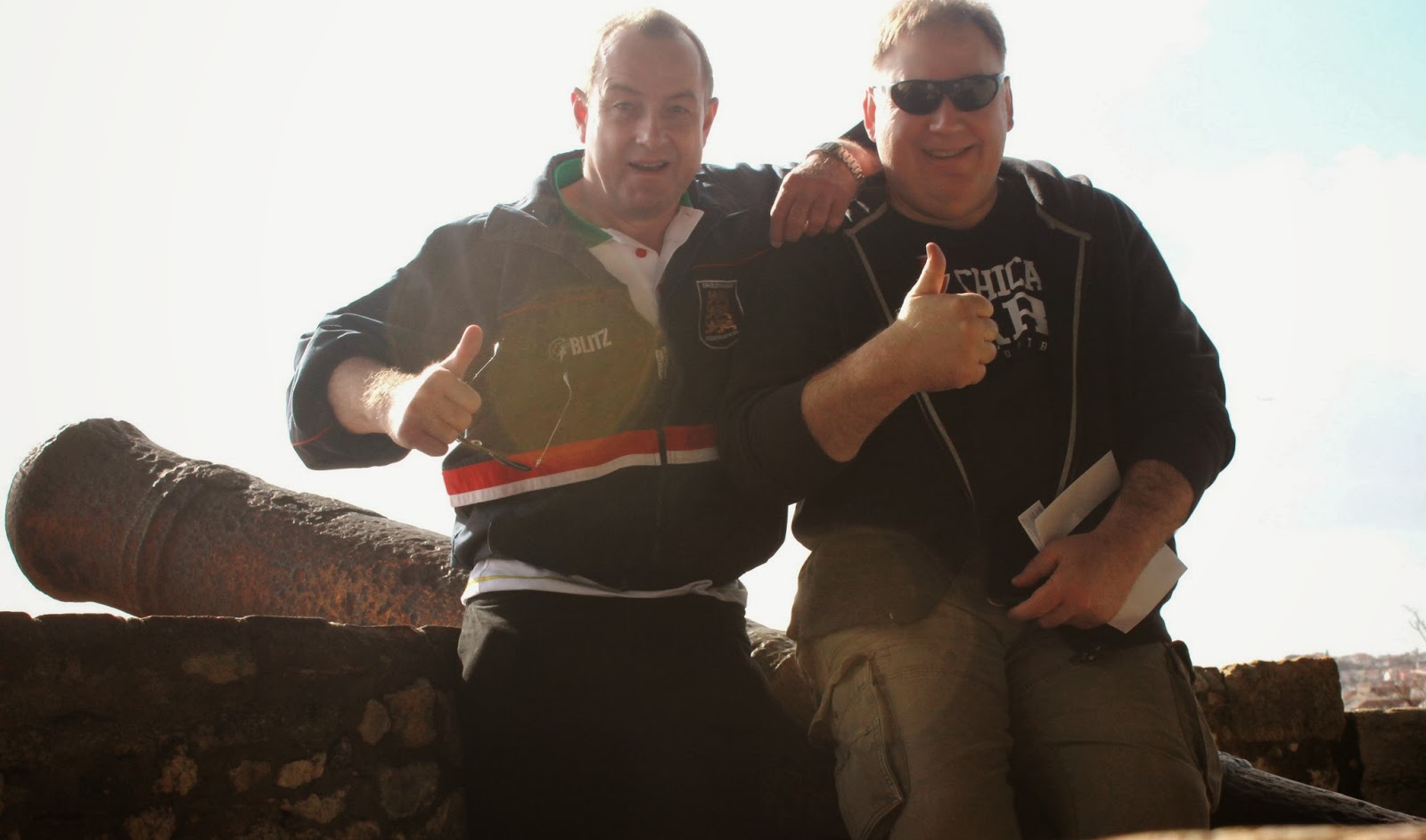On Sunday I attended the above course
organised and presented by Dale Gamble EKF chief Referee. Dale is also BKF British Chief Referee and a World level Referee.
The course was for Refs, Judges, Table
Officials and Coaches and was very well attended with myself along with the
following other Kofukan officials - Tracey Archer (EKF Referee A, Kata Judge
A), Chris Hoyle (prov EKF Judge B) and two of our Table Officials John and
Shaun Brundrett. These two guys have
supported Kofukan competitions for many years in their roles as Table Officials
and have attended Kofukan International Championships in South Africa, Japan and
all over Europe to name but a few. They are both therefore well experienced and
I always make a bee-line for one or both of them to work on my Tatami when
abroad since I know I can 100% depend on them not to make a cock-up!
Dale Gamble presents Christian Hoyle with his EKF Judge B Certificate, England Karate Judges Badge & EKF Licence Book
Dale Gamble presents Carl Jorgeson with his EKF Judge A Certificate.
Before the course started Christian Hoyle
(my eldest lad) received his award for EKF Kumite Judge B and Carl Jorgeson
from Aiwakai for Judge A. These awards
were based on the guys passing the written exam at the end of 2013 plus
successful practical at the huge (900+ entries) EKF Kyu Grades Championships at
Sheffield’s Pond’s Forge Sports Centre on the 26th Jan of this
year. Congratulations to both of them.
Dale invited Ivor Thomas and myself to sit
on the ‘Top Table’ along with RC member Tony Dent and help field any questions
or points raised during the course. Dale took us through a read-through of a
number of the articles in the current WKF Rules (v8 2013), often stopping to
elaborate on differences between Europe and what we do in the UK for our
Championships and various other details not specified in the rules. I made a note of these but since people pay
a fair amount of money to attend these course it would be unfair to present
these here in this forum. However, I
will say that Dale stressed the importance of not letting procedural mistakes
go through – the bout must be stopped and rewound back to the error.
Dale leads the Refs and Judges in Referee hand signals
After the theory part was completed, Dale
then took the Refs and judges through the correct protocol for Refs signals so
that we all appear to have the same form – bit like kata training really –
sharp, focussed and repetitive.
It was then the DREADED ‘Exam-Time’ for
those renewing qualifications and for the Coaches to attain their EKF
Badge. Sixty questions are presented on
a screen, automatically changing after 15 seconds and the coaches have to get
70% correct. They are all TRUE/FALSE
answers using the same format as in the Euro Examinations. Papers were marked at the start of the Squad
Selections and I am pleased to say that all Refs and judges achieved the
appropriate pass mark. The coaches will
find out later this week if they have been successful or not. An EKF Coaches Badge is mandatory for access
& movement around the areas at the Nationals in March (29th
& 30th).
The Referees team then moved downstairs to
the hall for commencement of the Squad Selections. Two areas were used and I was assigned as
Tatami Manager on Area 1 and Ivor as TM on Area 2. EKF Squad Coaches Willie Thomas, Paul Newby
& Davin Pack were in attendance along with Mo the Squad Doctor. Dale divided the refs and judges up equally
between the two areas for deployment by the TM’s.
Female Cadet & Junior Kumite was the
first event on my area and I had at my disposal the following thirteen – yes thirteen
personnel! (we’re usually very lucky to
have a full complement of four judges at tournaments):
Dave Robinson BKF Referee
Richard Burridge BKF Referee
Ben Brown BKF Referee
Geoff Dixon EKF Ref B prov
Sara Cotton EKF Ref B prov
Graham Mableson EKF Ref A
Brian Graham EKF Ref A
Ashley Peacock EKF Judge A
Dave Johnson EKF Judge A
Colin Broatch EKF Judge A
Denis Robinson EKF Judge B
Amy Coulson EKF Judge A prov
Shaun Brundrett – Table Official
Bearing in mind that there were EKF Squad
Selections it was important to try and keep the more experienced officials on the
mat whilst still giving the younger less experienced officials the opportunity
to test and prove themselves at this level of competition. This is effectively the highest level
competition that any of these guys can get in England other than Bronze Finals
and Finals in the WKF-category events at the EKF Nationals & BKF Four
Nations.
I therefore adopted the Euro method of Ref
deployment used in Lisbon, rather than the simple rotational method we
generally use at tournaments. In this
way I could keep the very experienced people like Dave, Richard & Ben on the area in the key
roles until I was confident that the panel were ‘pukka’ (which they all were!).
The roles used were Ref, Judge 1 to Judge 4, Kansa, Kansa Assistant Aka, Kansa
Assistant Ao, and Score Supervisor with Shaun as permanent Table Official. In this way nine officials would have some
involvement with each bout, leaving only three watching from the bench.
The cadet/junior bouts were complicated in
that if Cadet fought Cadet, then cadet rules and face masks were used, whereas
if cadet fought Junior then Junior rules were used with no face masks and
clearly Junior v Junior was Junior rules.
This was great experience for me since I
had to be responsible to ensure bouts were officiated as competently as possible - hence the
Euro Tatami management regime. One
mistake I did make was in not ensuring that the judges were neutral for each
bout – Doh! However, I am sure that the
guys would have indicated if there was a conflict of interest. I have now amended my TM form to indicate Association/Nationality.
We ended the fighting with three male
Junior Kumite bouts.
The only slightly contentious bits were:
1. Two flags for Ao punch for Yuko missed and a Jogai given since
she stepped out of the area after the technique. One of the officials on the bench tipped me
off to this and we had to stop the bout and rewind as per Dale’s briefing
earlier. It is vitally important for
Kansa to be on the ball for this.
2. An almost perfect Chudan Ushiro geri appeared to score to me,
but only one judge signalled Wazari with no support. When questioned it was mentioned that the
kick was thought not to have Zanshin so perhaps a good decision – I would love
to have seen this again on video!
3. One fighter in particular scored with three terrific long range
Gyaks using 1-2 footwork. However, all
three did not have Zanshin and Dale reminded us that the technique was somewhat
leaning so deficient and should not have been scored.
4. Support of the best-sighted judge was not always forthcoming
leading to what I thought were a couple of good scores being missed. This however comes with experience with this system.
My one regret and also Ivor’s was that as
TM’s we both did not get to judge or referee even one bout. Come back Peter and Vince as TM’s!
At the end of the Selections, Dale briefed
the fighters and EKF Coaches with his main findings after observing the
afternoon’s proceedings for such things as the leaning on Gyaks and importance
of maintaining Zanshin.
We then re-convened upstairs for a ten
minute debrief of the officials and review of the up and coming calendar of
events. Advice on the correct signal for
Yame was demonstrated, the need to watch Ref positioning (eg in front of
Kansa), attempted throws and Cat1/Cat2 differentiation and bowing protocol for
competitors – quick nods of the head were observed and this is not good
etiquette.
The next course is March 16th
in St Albans. Put the date in your
diaries – these are good courses to get valuable top-level experience and top
tuition from a World Referee.











.jpg)










